Injection Therapies
Dextrose Prolotherapy: A Natural Approach to Healing Arthritis, Joint Pain, and Soft Tissue Injuries
What is Dextrose Prolotherapy?
Dextrose prolotherapy is a regenerative injection therapy that stimulates the body's natural healing processes to strengthen and repair injured or painful joints and connective tissue.
It involves injecting a solution, typically consisting of dextrose (a type of sugar), into the affected areas to promote tissue repair and reduce pain.
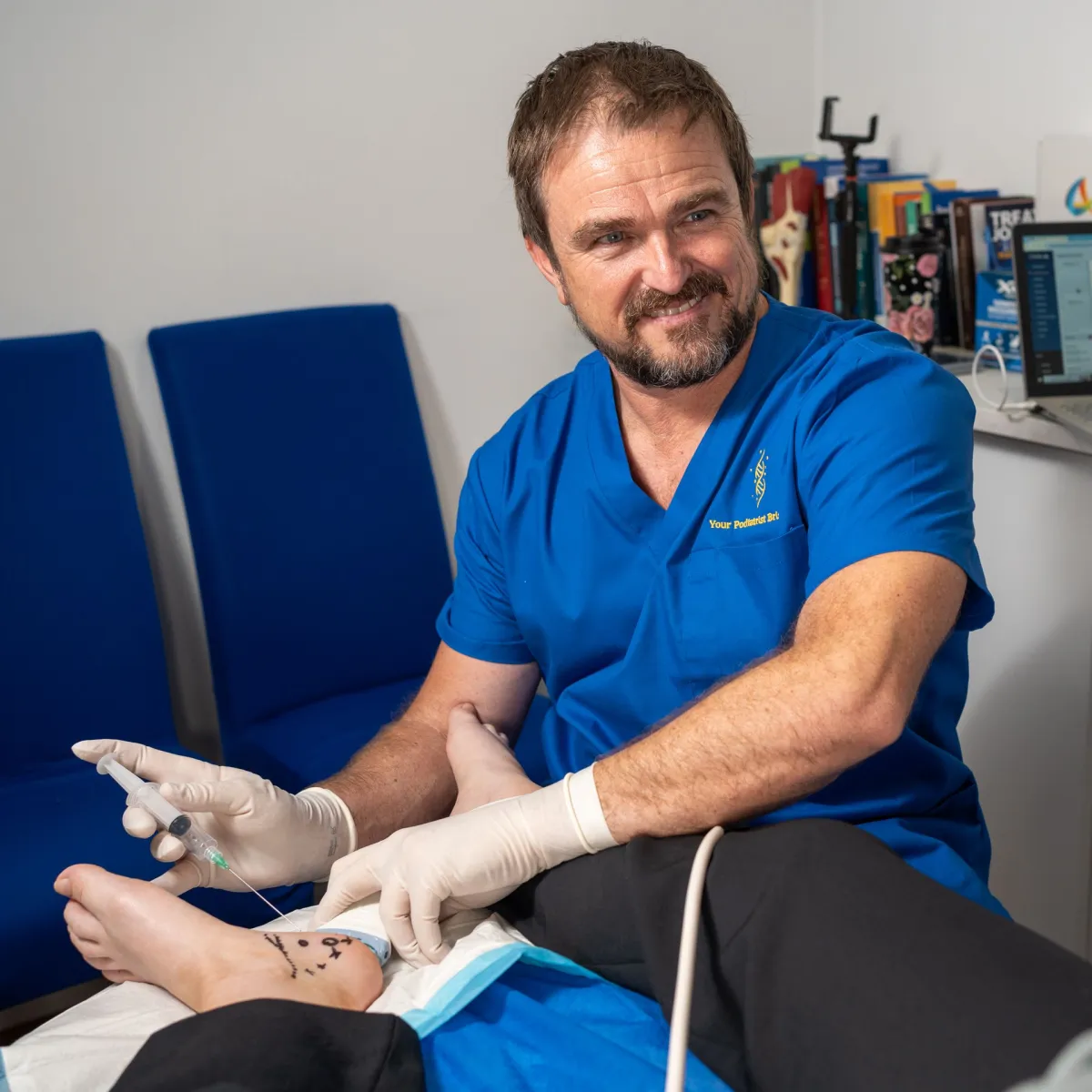
How Does It Work?
The dextrose solution acts as a mild irritant when injected into ligaments, tendons, or joint spaces. This irritation triggers the body's healing response, leading to:
Increased Blood Flow: Enhances the delivery of nutrients and oxygen to the injured area.
Collagen Production: Stimulates the growth of new collagen fibers, strengthening weakened connective tissues.
Reduced Inflammation: Helps decrease swelling and discomfort over time.
How High-Concentration Dextrose Tightens Ligaments and Soft Tissue
Mechanism of Action: Stimulating Natural Healing Processes
Dextrose prolotherapy involves injecting a high-concentration dextrose solution into injured or weakened ligaments, tendons, or joint spaces. The primary goal is to stimulate the body's natural healing response, leading to the strengthening and tightening of these soft tissues. Here's how it works:
1. Localised Inflammation Induction
Mild Irritant Effect:
The hypertonic dextrose solution acts as an osmotic irritant when injected into the targeted area.
Controlled Inflammation:
This irritation leads to a localised, controlled inflammatory response, which is the first phase of the healing process.
2. Activation of Healing Pathways
Release of Growth Factors:
The inflammatory response triggers the release of growth factors and cytokines.
Cellular Recruitment:
Attracts fibroblasts and other reparative cells to the site of injury.
3. Collagen Synthesis and Tissue Regeneration
Fibroblast Stimulation:
Fibroblasts begin synthesizing new collagen fibers, the primary building blocks of ligaments and tendons.
Collagen Deposition:
Newly formed collagen is deposited along the lines of stress, enhancing the structural integrity of the tissue.
Tissue Remodeling:
Over time, the new collagen matures and remodels, increasing the thickness and strength of the ligaments and tendons.
4. Tightening and Strengthening of Soft Tissues
Improved Tensile Strength:
The proliferation of new collagen fibers leads to stronger connective tissues capable of withstanding greater mechanical stress.
Enhanced Joint Stability:
Tightened ligaments and tendons provide better support to joints, reducing pain and improving function.
Reduced Laxity:
Addresses ligament laxity (looseness) that can contribute to joint instability and discomfort.
Specific Applications
Plantar Fasciitis
Healing the Plantar Fascia:
Dextrose injections promote the repair of micro-tears in the plantar fascia ligament, reducing heel pain and improving foot mechanics.
Restoring Arch Support:
Strengthening the plantar fascia helps maintain the foot's arch, contributing to overall foot stability.
Achilles Tendonitis
Repairing Tendon Damage:
Stimulates healing of the Achilles tendon by encouraging collagen production in areas of degeneration.
Enhancing Flexibility and Strength:
Leads to a stronger tendon less prone to re-injury.
Arthritis and Joint Pain
Supporting Joint Structures:
Tightens ligaments around joints affected by arthritis, providing better support and reducing excessive movement that can cause pain.
Reducing Inflammation:
Over time, improved joint stability can decrease chronic inflammation associated with arthritis.
Patient Experience
Treatment Sessions:
Typically involves a series of injections over several weeks or months, depending on the severity of the condition.
Post-Injection Expectations:
Mild soreness or swelling at the injection site may occur temporarily.
Patients are usually encouraged to continue gentle movements to promote circulation.
Benefits of Dextrose Prolotherapy
Natural Healing:
Utilises the body's own repair mechanisms without relying heavily on medications.
Customisable:
Treatment plans can be tailored to individual needs and conditions.
Non-Surgical Treatment:
Offers an alternative to surgery for various musculoskeletal conditions.
Minimal Downtime:
Allows for a quicker return to daily activities compared to surgical options.
What to Expect During Treatment
Initial Consultation:
Comprehensive evaluation by a qualified healthcare professional to determine suitability.
Procedure Details:
Performed in a clinical setting.
The area is cleaned and prepared; local anesthesia may be applied.
The dextrose solution is injected using fine needles into specific sites.
Treatment Sessions:
Multiple sessions may be required, typically spaced weeks apart.
The number of sessions varies based on the condition and patient response.
Aftercare:
Mild soreness at the injection site is common.
Patients are usually advised to avoid strenuous activity for a short period.
Safety and Considerations
Side Effects:
Temporary pain or swelling at injection sites.
Rarely, allergic reactions or infection may occur.
Contraindications:
Not recommended for individuals with certain medical conditions; a thorough medical history is essential.
Professional Administration:
Should be performed by trained and experienced practitioners to ensure safety and effectiveness.
Is Dextrose Prolotherapy Right for You?
Consider dextrose prolotherapy if you:
Suffer from chronic joint or tendon pain unrelieved by conventional treatments.
Prefer a non-surgical, minimally invasive approach.
Are looking to enhance your body's natural healing capacity.
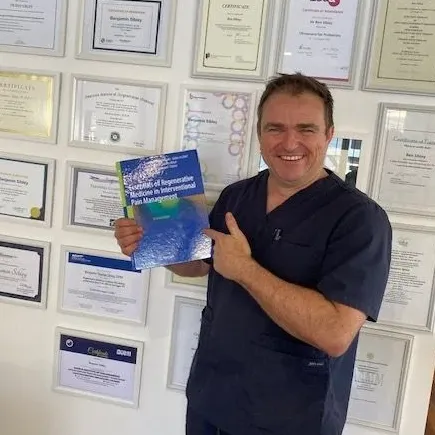
Consultation and Next Steps…
Embarking on dextrose prolotherapy begins with a personalised consultation:
Assessment: Understanding your medical history, current condition, and treatment goals.
Discussion: Exploring the potential benefits and any risks associated with the therapy.
Planning: Developing a customized treatment plan tailored to your specific needs.
Recent Randomized Controlled Trials Supporting Prolotherapy in the Treatment of Joint Pain, Arthritis, and Soft Tissue Injuries
Prolotherapy, a regenerative injection therapy, has been the subject of various randomized controlled trials (RCTs) exploring its efficacy in managing joint pain, arthritis, and soft tissue injuries. Below is a compilation of 10 recent RCTs from the Medline database that support the use of prolotherapy:
1. Rabago D, Mundt M, Zgierska A, et al.
Title: Dextrose Prolotherapy for Knee Osteoarthritis: A Randomized Controlled Trial
Journal: Annals of Family Medicine, 2013;11(3):229-237.
Summary: This study demonstrated that dextrose prolotherapy resulted in significant improvements in pain, function, and stiffness among patients with knee osteoarthritis compared to saline injections and exercise groups.
2. Sit RW, Chung V, Reeves KD, et al.
Title: Hypertonic Dextrose Injections (Prolotherapy) for Knee Osteoarthritis: A Double-Blind Randomized Controlled Trial
Journal: Annals of Family Medicine, 2020;18(3):235-242.
Summary: The trial found that patients receiving hypertonic dextrose prolotherapy reported greater reductions in knee pain and improved function compared to those receiving normal saline injections.
3. Rezasoltani Z, Taheri M, Momenzadeh S, et al.
Title: Comparing the Effectiveness of Dextrose Prolotherapy and Physiotherapy in the Treatment of Knee Osteoarthritis
Journal: Turkish Journal of Physical Medicine and Rehabilitation, 2019;66(4):340-347.
Summary: This RCT concluded that dextrose prolotherapy was more effective than physiotherapy in reducing pain and enhancing knee function in osteoarthritis patients.
4. Choi SR, Lee HJ, Lim YT, et al.
Title: Efficacy of Dextrose Prolotherapy for Rotator Cuff Disease: A Randomized Controlled Trial
Journal: Annals of Rehabilitation Medicine, 2017;41(5):785-792.
Summary: The study showed that prolotherapy significantly improved pain and shoulder function in patients with rotator cuff lesions compared to a control group undergoing only exercise therapy.
5. Fariba S, Razieh D, Nasim F, et al.
Title: Comparing the Effects of Prolotherapy and Corticosteroid Injection in the Treatment of Lateral Epicondylitis: A Randomized Clinical Trial
Journal: Journal of Pain Research, 2020;13:1549-1557.
Summary: Prolotherapy was found to be as effective as corticosteroid injections in reducing pain and improving grip strength in patients with lateral epicondylitis (tennis elbow), with longer-lasting effects.
6.Hashemi M, Moradi A, Tavana B, et al.
Title: Comparison Between Prolotherapy and Physiotherapy in the Treatment of Patients with Knee Osteoarthritis: A Randomized Clinical Trial
Journal: Journal of Pain Research, 2019;12:1699-1705.
Summary: Patients receiving prolotherapy experienced greater pain relief and functional improvement than those undergoing physiotherapy.
7.Eslamian F, Amouzandeh B, Ramezan Shirazi M, et al.
Title: The Effects of Dextrose Prolotherapy Versus Normal Saline Injection for the Treatment of Chronic Low Back Pain: A Randomized Clinical Trial
Journal: Anesthesiology and Pain Medicine, 2020;10(3).
Summary: Dextrose prolotherapy provided significant pain reduction and improved disability scores compared to saline injections in patients with chronic low back pain.
8. Rahimzadeh P, Imani F, Faiz SH, et al.
Title: Comparative Effectiveness of Intra-Articular Injection of Platelet-Rich Plasma and Prolotherapy with Dextrose in Patients with Knee Osteoarthritis
Journal: Biomedical Journal of Scientific & Technical Research, 2019;18(5):13907-13912.
Summary: Both prolotherapy and platelet-rich plasma injections were effective in reducing pain and improving knee function, with no significant difference between the two treatments.
9. Kim WM, Park SH, Shin DY, et al.
Title: A Randomized Controlled Trial of Prolotherapy for Peroneal Tendonitis
Journal: Journal of Alternative and Complementary Medicine, 2019;25(2):196-201.
Summary: Prolotherapy significantly reduced pain and improved functional outcomes in patients with peroneal tendonitis compared to control treatments.
10. Gül U, Karatay S, Melikoglu MA, et al.
Title: The Effectiveness of Prolotherapy on Tendinopathies: A Randomized Controlled Trial
Journal: Clinical Rheumatology, 2021;40(7):2707-2715.
Summary: The trial indicated that prolotherapy injections led to significant improvements in pain and function for patients with various tendinopathies compared to placebo injections.
Disclaimer: This website is for informational purposes only and does not constitute medical advice. Consult with a licensed healthcare professional before starting any new treatment.

5-Stars on Google
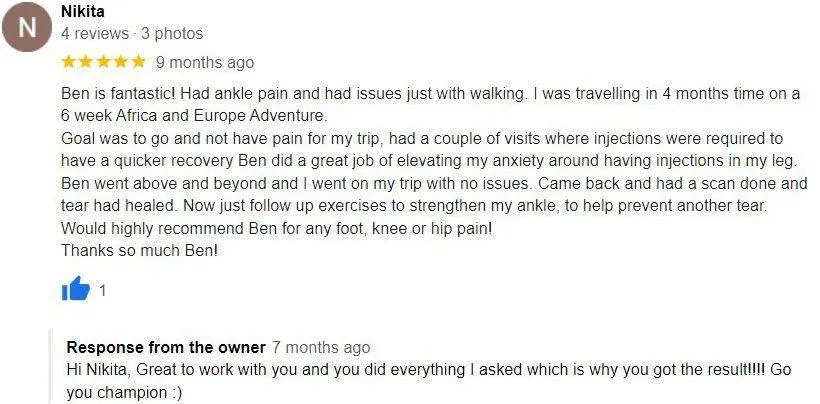

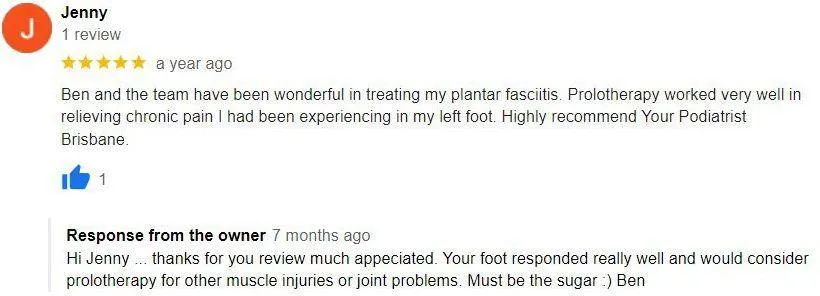
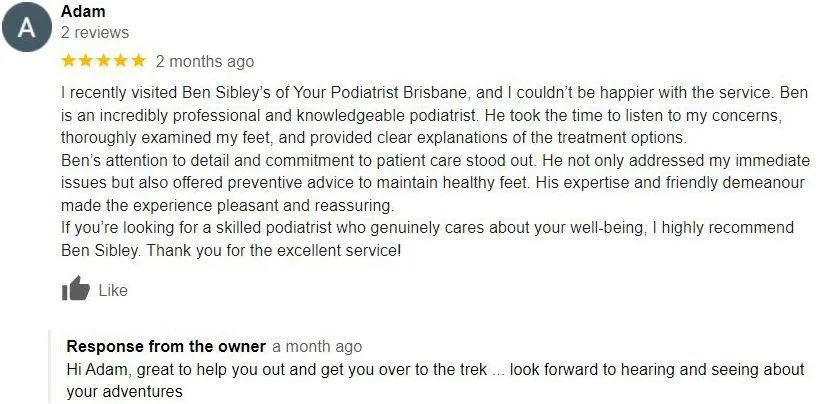

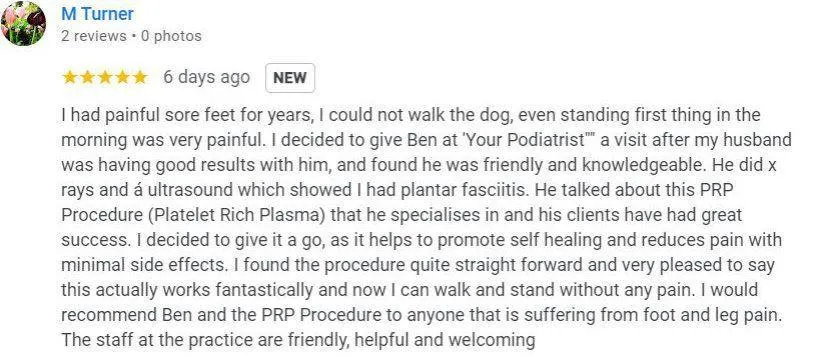
Your Podiatrist Brisbane
Phone: (07) 5495 6437
Email: [email protected]
Address:
7 Blue Gum Terrace
Caboolture South QLD 4510
What to Expect…
Prior to your first initial consultation, you will be required to complete an introductory 15 minute phone call. This will give you more details and information and to ensure that you have no contra-indications and make sure we can help you. If we feel we’d be a great fit for each other, we will schedule your in office detailed and comprehensive appointment with one of our doctors.
Copyright 2026 © yourpodiatristbrisbane.com | Terms and Conditions | Legal | Cookies | Privacy
